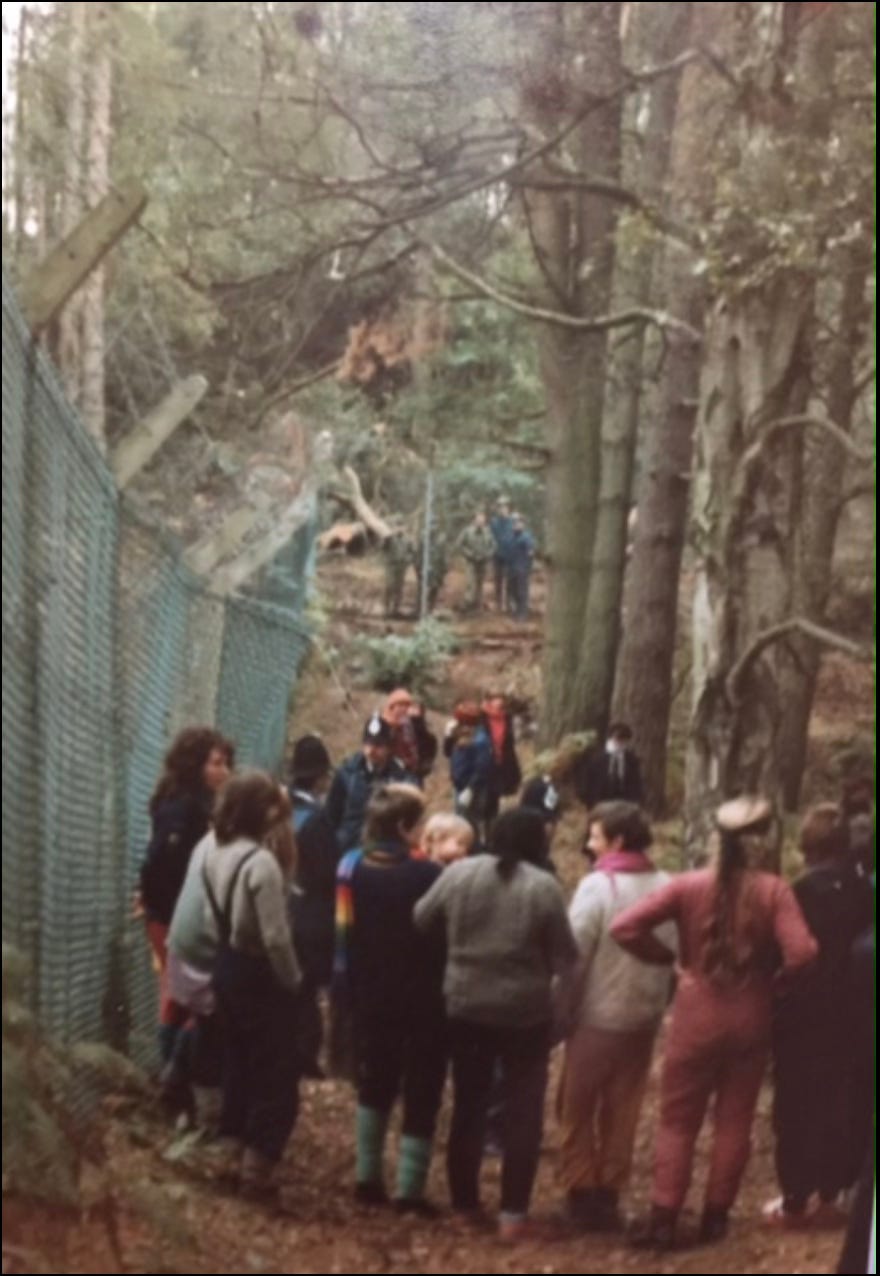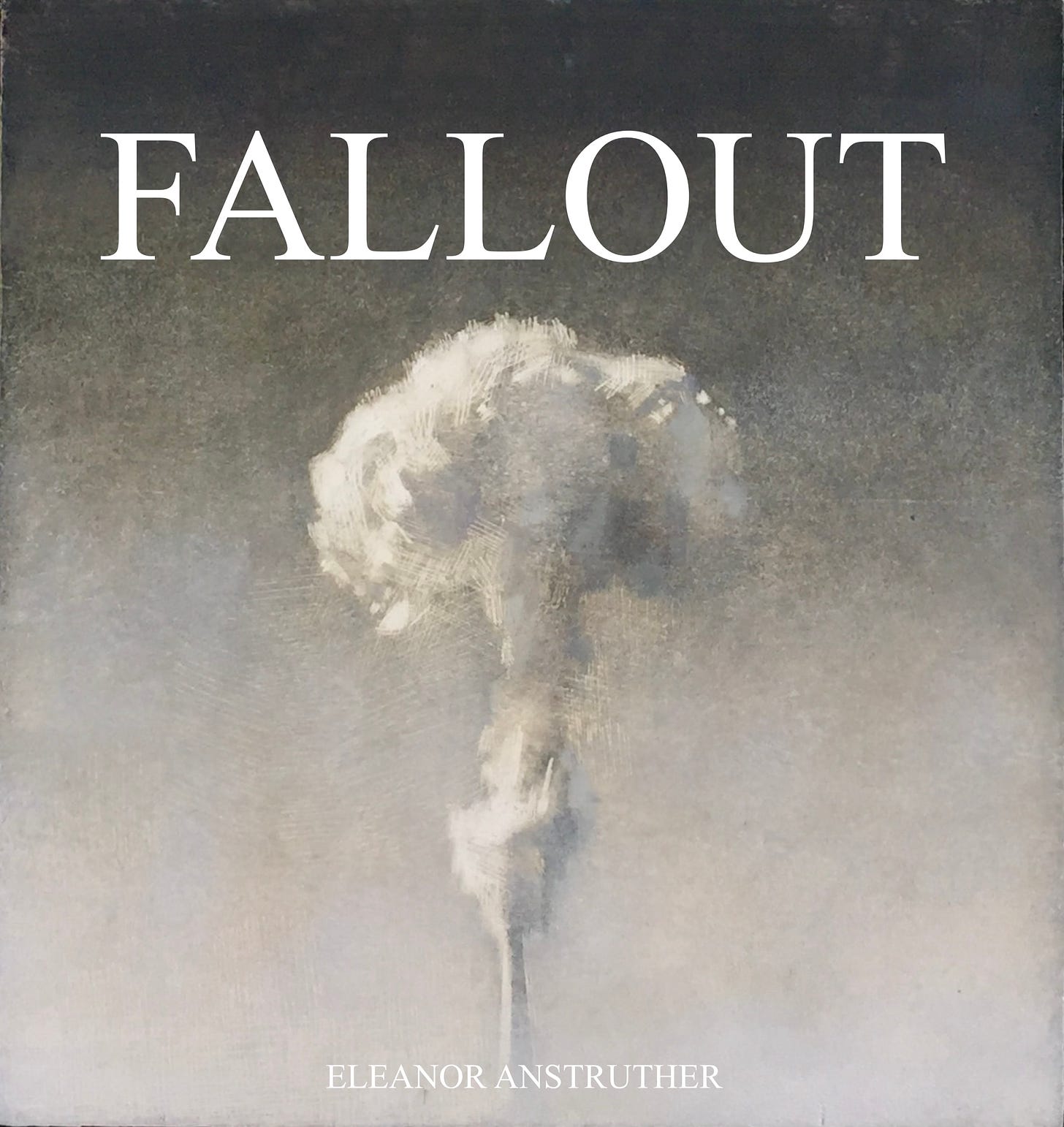“We’re going to walk the perimeter.” It was Peggy. She was smiling like she never did at school.
Bridget weaved out of the press of bodies and fell into step with Peggy and her mum. There were others walking too, a slow march with the fence on their right.
“It’s wonderful you could come with us,” said Kate.
“Isn’t it great?” said Peggy.
“I don’t understand how they all knew,” said Bridget.
She’d never seen anything like it. It was as if all these women had got a message, but it hadn’t been on the news and it hadn’t been in the paper. And how did they know what to bring? They were all doing the same thing, tying ribbons and photographs and banners to the fence, and hugging and holding hands and walking and singing and crying and some of them were shouting at the squaddies, the men in uniform who stood like toy soldiers, chain link scarring their faces.
Peggy started singing, “Which side are you on?” and her mum joined in and Bridget did too, almost without thinking, learning as she went words of suicide and genocide and as they sang they gathered voices, this wave of women that swelled and thinned as they walked on.
“We should find somewhere to stand,” said Kate.
Bridget was starving hungry. She tried to undo her bag and get the biscuits out without stopping.
“We could stop by Blue Gate if you like,” said Kate.
They were coming up on a puddle of tents and armchairs, a fire and a crowd like at the other gate, but smaller. The sun was trying to push through the clouds. It felt lighter, the drizzle had almost stopped. They warmed their hands at the fire pit, Bridget felt damp, her legs ached. Kate came back with a tin mug of tea. They shared it between them.
On every side women talked, smoked, shared biscuits. Women old like her mum, ancient like her gran, and young like the sixth formers at school, women in headscarves like Kate Hilperton, and anoraks like Miss Jenkins who she hadn’t seen for hours, who’d she’d lost at Main Gate. Women who would normally be pushing prams or getting their hair done or serving chips or polishing the assembly hall floor, women she’d never heard speak in her life and here they all were, speaking like they’d never shut up. Bridget opened her packet of McVitie’s digestives, took two and passed the packet to Peggy who passed them on round the circle till they were empty, and normally, if she’d been camping with her mum and dad, she’d have got angry and sulked, but this felt like an honour, these women eating her biscuits, like it made her one of them, she didn’t even mind that no one noticed they’d been hers.
“It’s called non-violent direct action,” said a voice beside her, a woman who looked like Granny Reynolds before she lost all her teeth. Old. A woolly hat.
“Criminal damage isn’t violence,” said the woman opposite her. She’d got herself one of the armchairs. It was the colour of Miss Jenkins’ corduroy skirt that she always wore.
“How is cutting a fence not violent?”
“The fence doesn’t feel. It’s only violent if it’s received by the receiver as a violent act. The fence is inanimate. It doesn’t receive anything as feelings.”
“But it’s an act of violence against something.”
“Cutting off a finger is an act of violence. Cutting a fence is an act of non-compliance.”
“It’s an act of peaceful resistance,” said a woman on Bridget’s other side. It was the blonde spiked woman she’d seen at the Esso garage. Up close, Bridget could see it wasn’t just her ears that were pierced all up the edges, her nose was too, and her lip, as if she’d been peppered by spikes and hoops and studs. She smoked a roll up cigarette that was dark brown. Her fingers were dirty. Her nails were black with mud. Her boots were encrusted, and she wore heavy jeans and a multi-coloured woollen coat covered in badges like Peggy’s satchel.
Bridget said to Peggy, “What are they talking about?”
“This,” said Peggy. She sat on the ground. “Try and lift me.”
Bridget looped her arms under Peggy’s shoulders but Peggy slumped immediately, her body as heavy as a coal sack, a dead weight, her head lolled. She was heavier than Bridget could move.
“See?” Peggy wiped her hands on her jeans and stood up. “Non-violent direct action. An act of resistance is to not help them move you. There’s workshops you can go on. They’ll teach you.”
“For what, though?”
“For when the police come.”
Miss Jenkins hadn’t said anything about the police.
But there were whistles blowing and it was as if everyone knew what that meant. Cold dregs of tea were chucked on the ground, tin mugs put down, bags picked up, a wave to the fence, they spread out like butter along it, these women who knew what to do as if they’d been trained. And where had Bridget been all this time while all these women were learning what to do with a fence and squaddies and people who want to kill them? At St Biddulph’s learning the names of Henry the Eighth’s wives and algebra and useless shit like that when she could have been here, learning life.
She hurried after Peggy.
“Look at the banners,” said Kate.
These huge works of art, up and down the line, as far as she could see, banners made of bedsheets and woven velvet, black and white, and rainbow colours, words sewn in, drawn on, all saying the same thing, calling for peace, freedom, to be left alone. A wedding dress pinned like a ghost bride, a plastic baby squashed, Kate got her banner out of her bag, and Peggy helped unfurl it. They held it up, Bridget took one corner and Peggy the other while Kate tied it high on the fence. Restore Greenham Common to the people sewn in huge colourful letters on a background of deep blue, an eiderdown like the one on her mum and dad’s bed. They’d sewn tickertape flaps along each edge that Kate pinned to the fence, string and safety pins, her fingers reaching through the chain link. There was the symbol Bridget saw everywhere, a circle with lines and CND written beneath it. A fabric tree sewn on the side and underneath, along the bottom edge a white strip that had written on it in black magic marker, This land was stolen. Reclaim Greenham Common.
The drizzle began again, it was cold, a wind blew in soft jerks, flapping the fabric behind Bridget’s head, stroking her cheek as Kate reached for her hand. On her other side appeared the blonde spiked woman, smiling. She held out her palm to Bridget and Bridget laid her own upon it, their fingers curling over knuckles, the warmth of another human on a cold wet day with sunshine trying to push through like the message of these women to the squaddies at their backs, to the government that wasn’t here, that couldn’t hear them for all the noise of bombs and threats and guns. An endless stream of women, a crowd of every female face that could be on the high street, watching telly, cooking dinner, but instead they were here, finding their place on the fence, miles from houses and shopping and cleaning and yet they kept coming.
“Squeeze hands, Bridget,” said Kate beside her. “We’re sending a wave around the whole nine mile perimeter.” She squeezed and Bridget sent the message on through the blonde spiked pierced woman on her other side.
“It’s like we’re all humans,” she said to Kate who didn’t hear her, who smiled and shouted the words of her song into the air.
“It’s like without men we don’t have to be anything,” she said to the blonde spiked woman on her other side.
“Fuck the patriarchy,” shouted the woman, raising her arm and lifting Bridget’s with it.







“It’s like we’re all humans. . . It’s like without men we don’t have to be anything.” Ohhhh. This touched me to the core! Bridget gets it! 🔥
Such beautiful writing…
“It’s called non-violent direct action,” said a voice beside her, a woman who looked like Granny Reynolds before she lost all her teeth. Old. A woolly hat.”
I just love that paragraph!